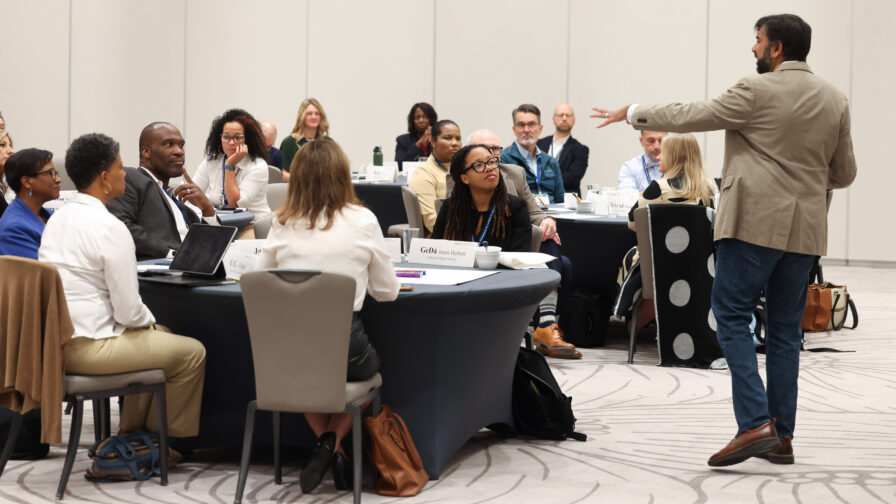
Training Superintendents like CEOs Accelerates Student Performance, UVA Partnership Finds
By Molly Mitchell
UVA’s Partnership for Leaders in Education (PLE) draws on 20 years of experience to meet post-Covid challenges in education.
In an assessment last year, the National Center for Education Statistics (NCES) reported sharp declines in reading and mathematics skills among the nation’s 9-year olds, signaling a significant educational backslide nationwide. While the loss of progress affected all demographics, gaps between higher and lower performing students widened even more dramatically.
The trailing impact of the pandemic, combined with shortages in hard-to-staff positions and rising concerns for the mental well-being of students and teachers, means that schools are struggling. UVA’s Partnership for Leaders in Education (PLE) is on a mission to help education leaders overcome these challenges through their unique approach and 20 years of successful school transformations.
PLE is a joint venture between the University of Virginia Darden School of Business and the UVA School of Education and Human Development that has helped transform education systems with a rigorous evidence-based approach, adapted to each community’s context, in more than 130 school districts across the country. At the organization’s 20th Anniversary Forum, PLE executive director William Robinson addressed the assembled educators. “We were founded to serve you, the leaders doing the most important work imaginable,” he said, “and to have the opportunity to take our mission to the next level with you to create transformational conditions in which underserved students receive the opportunities they deserve.”
The quorum reflected on PLE’s history and developed plans for the future over the course of the two-day conference. Darden Professor and one of PLE’s founders June West, reflected on the idea that started it all. Twenty years ago, Brandt Allen, the dean of executive education at the time, asked her what one thing she believed would most help the nation’s education system. She said, “That’s a no-brainer. I would bring superintendents and their top executive teams to the Darden School and put them through the kind of executive education training we do for CEOs.”
PLE was formed that same year, 2003, and over the next 20 years the organization’s approach yielded tremendous results for education leaders and the schools they oversee. The partnership has served more than 800 schools across 135 districts and 32 states. It became the only remaining K–12 leadership development organization with journal level evidence of impact on substantially raising student achievement. In fact, 50% of PLE’s school partners have seen double-digit gains in math or language arts within two years.
Soon after its inception, PLE focused on “turnaround” projects, which meant focusing on underperforming schools and helping individual principals develop the skills, strategies and tools to drive fast and dramatic change. But it became clear that the partnership had as much to offer – and was as needed – in most schools, not just underperforming districts. The partnership also evolved to focus more on developing collective ownership to effect systemic change, rather than developing individual “hero” leaders. “Collective leadership can be slower, but it’s more powerful and effective,” said Antonio Burt, CEO of KIPP Memphis. “Educators don’t control everything. Solving the literacy challenge requires collective leadership.”
As PLE has evolved to focus more on context, collective capacity-building, research and equity while keeping its founding focus on leadership skills, data-driven practice and change management, its impact has increased. Many of the PLE partner schools are outperforming their pre-pandemic assessments as of this year, contrary to national trends. Cohort 20 is the largest ever, with 77 schools represented. While ever evolving, the organization’s strong set of core ideas remain effective and consistent. “UVA PLE has anchored itself in core tenets that despite many iterations, and changes, there are still tools that you can pull and reference that have stood the test of time,” said Denise Watts, superintendent of Savannah Chatham County Schools.
The PLE has seen many school districts advance successful system-wide change, including stories like in Fulton County, Georgia, where the number of F schools fell from 29 to 3 and the number of students enrolling in associate and four-year programs from partner high schools more than tripled. But the community of PLE is striving for more. “You have shown us that it is absolutely possible to turn around a school or a number of schools,” said former PLE executive director LeAnn Buntrock. “But I still haven’t seen true district-wide transformation yet. And I absolutely believe that’s possible.… It’s going to take trust, partnerships, political will and education organizations all being willing to work together to make that happen.”
The University of Virginia Darden School of Business prepares responsible global leaders through unparalleled transformational learning experiences. Darden’s graduate degree programs (MBA, MSBA and Ph.D.) and Executive Education & Lifelong Learning programs offered by the Darden School Foundation set the stage for a lifetime of career advancement and impact. Darden’s top-ranked faculty, renowned for teaching excellence, inspires and shapes modern business leadership worldwide through research, thought leadership and business publishing. Darden has Grounds in Charlottesville, Virginia, and the Washington, D.C., area and a global community that includes 18,000 alumni in 90 countries. Darden was established in 1955 at the University of Virginia, a top public university founded by Thomas Jefferson in 1819 in Charlottesville, Virginia.
Press Contact
Molly Mitchell
Senior Associate Director, Editorial and Media Relations
Darden School of Business
University of Virginia
MitchellM@darden.virginia.edu




